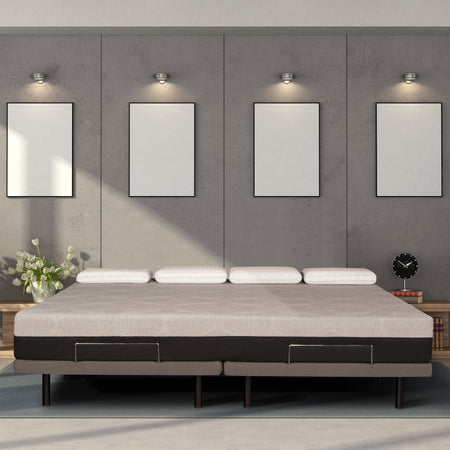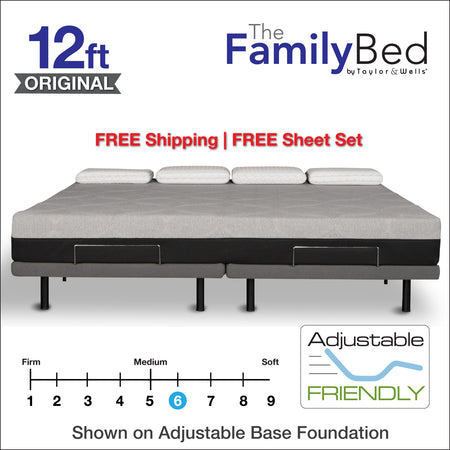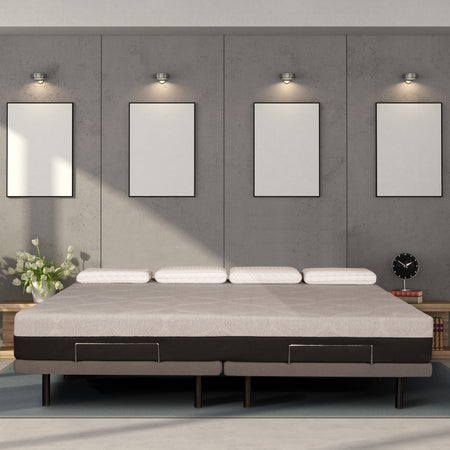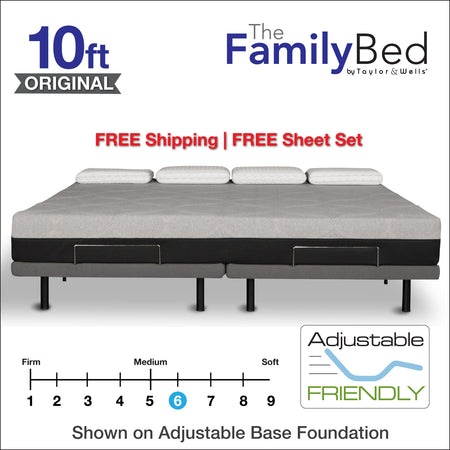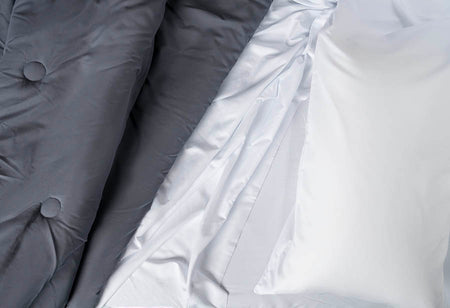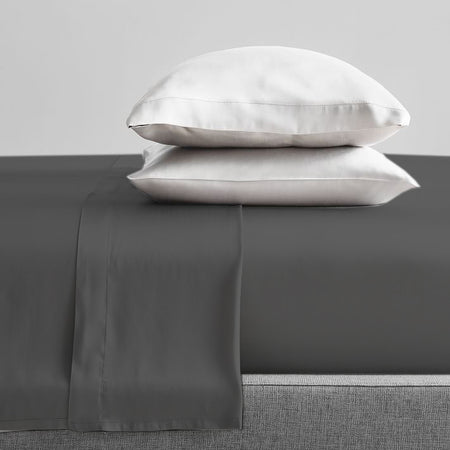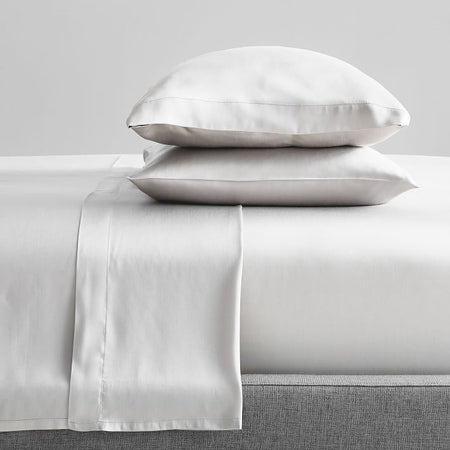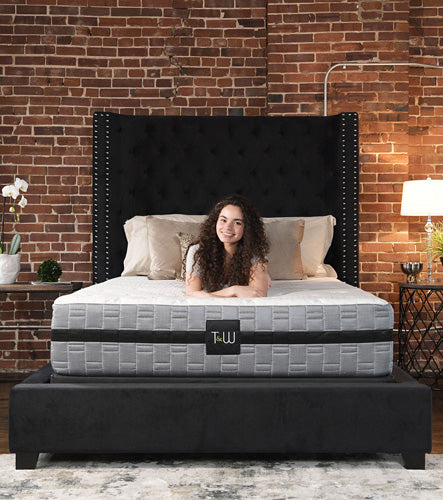The quality of your mattress can mean the difference between a good night's sleep and a restless, uncomfortable night. And since sleep is a fundamental aspect of your well-being, choosing the perfect mattress is essential.
But with many options available, and the seemingly similar appearance of mattresses, it can be challenging to know which one is right for you. That's why we've created a comprehensive buying guide to help you decide. Before we dive into that, let's look at the relationship between health and sleep and why a good mattress matters.

The Impact of a Good Mattress on Sleep Quality and Overall Health
Sleep affects almost all aspects of your health and well-being. Your body needs a good night's rest to function correctly. One of the easiest solutions for restful sleep is a comfortable mattress. Here are some key ways in which a good mattress can have a positive impact:
- A good mattress provides optimal support and comfort level, allowing you to maintain a more comfortable sleep position throughout the night.
- It distributes your body weight evenly, relieving pressure on sensitive areas such as your shoulders, hips, and joints.
- It reduces exposure to allergens like mites, pet dander, and pollen, creating a healthier sleep environment and minimizing potential respiratory issues during sleep.
- A good mattress creates an optimal sleep environment that allows the brain to recharge and process emotions. This helps regulate mood, improve concentration, enhance memory, and support overall cognitive function.
- Adequate, high-quality sleep rejuvenates your body and mind, resulting in increased energy levels and improved daytime productivity.
Studies have linked poor sleep to cardiovascular disease, diabetes, high blood pressure, obesity, weakened immune system functioning, and memory and concentration problems.
How to Choose the Right Mattress

Whether you're buying online or in person, these five secrets will help simplify the process and guide you toward finding the ideal mattress for a great night's sleep:
Understand Different Mattress Types
Several types of mattresses are available on the market, each with unique characteristics. So, one of the first steps is to educate yourself about these mattress types to tell them apart. Remember, there's no best mattress for everyone, and the ideal one will depend on your body type, sleep position, and any pains, aches, or health conditions. With that said, here are the most common mattress types:
Innerspring mattresses
These mattresses feature a steel coil support system. They provide excellent support, durability, and breathability. If you prefer a traditional feel and a bouncy surface, then innerspring mattresses can be suitable.
Memory foam mattresses
Memory foam mattresses conform to your body shape, providing excellent pressure relief. They are known for their motion isolation and ability to minimize disturbances from a restless partner. These mattresses are ideal when seeking body-contouring comfort.
Hybrid mattresses
Hybrid mattresses combine different materials, such as memory foam, latex, and innerspring coils, to offer a balance of comfort and support. They provide the benefits of multiple mattress types and cater to a wide range of preferences.
Determine the Right Firmness Level
Firmness is subjective, and what feels comfortable to one person may not be the same for another. But a mattress that's too hard can put excessive pressure on your body and cause discomfort, while a mattress that's too soft may lack proper support and lead to poor spinal alignment. Balance support and comfort to ensure head, neck, hip, and spinal alignment. To do so:
Consider your Sleeping Position
- If you primarily sleep on your side, you'll want a mattress with a slightly softer firmness to allow for proper contouring and pressure relief on your shoulders and hips.
- Back sleepers generally require a medium-firm to firm mattress to maintain proper spinal alignment and prevent sinking into the mattress.
- For stomach sleepers, a firmer mattress is recommended to avoid excessive sinking of the midsection and keep the spine aligned.
Body Weight and Type
- Lighter individuals may prefer a softer mattress as they may not exert enough weight to compress a firmer surface adequately.
- Heavier individuals typically require a firmer mattress to provide sufficient support and prevent excessive sinkage.
Personal Preference
Ultimately, your personal preference plays a significant role. Some people prefer a plush, softer feel, while others a firmer, more supportive surface. Consider your comfort preferences and concerns, such as back pain or joint issues.
Trial and Testing
It is a good idea to test the mattress before purchase. Lie down in various positions and spend a few minutes assessing how it feels for you. Remember that the initial feel may differ from the long-term comfort, as mattresses may have a break-in period.
Consider Size and Space

Another secret to choosing the perfect mattress for a great night's sleep is carefully considering its size and the available space in your bedroom. The last thing you want is to end up with a mattress that is either too big or too small for your needs. Measure your bedroom to ensure enough space for your desired mattress size.
For example, a king-size mattress might be too large and overpowering if you have a small bedroom, while a twin or full-size mattress could be a better fit. Conversely, if you have a spacious bedroom, a larger mattress like a queen or king can provide ample space for comfortable sleep. Other considerations include:
- Whether you're sleeping alone or with a partner. If you share your bed with a partner, opt for a larger size to ensure you have enough space to sleep comfortably.
- Your body size and sleep positions. If you are taller or have a larger frame, you may require a longer or wider mattress to ensure proper support and comfort. Likewise, if you tend to sprawl out while sleeping, a larger mattress can provide the necessary space for unrestricted movement.
- Room layout and furniture placement: Ensure that the chosen mattress size allows for easy access to the room's doors, windows, and other functional areas.
- Future changes or needs may arise. If you anticipate sharing the bed with a partner or expect other lifestyle changes, choose a larger mattress size to accommodate those changes without replacing the mattress later.
- Height of the mattress and the bed frame to ensure easy accessibility and a cohesive look in your bedroom.
Evaluate Materials for Allergies and Sensitivities
Allergies or sensitivities can affect your sleep quality and overall well-being. According to the Sleep Foundation, allergens irritate the nasal passages and trigger uncomfortable symptoms like sneezing, nasal congestion, and watery eyes. All these affect the ability to breathe easily and can impact your ability to fall or stay asleep. So, if you're allergic or sensitive to certain mattress materials, you should:
- Go for mattresses made from hypoallergenic materials like organic cotton, bamboo, etc., as these resist allergens and offer a healthier sleep environment.
- Opt for mattresses with breathable materials that promote airflow to reduce the chance of moisture buildup and mold or mildew growth.
- Choose mattresses made with low volatile organic compounds (VOCs) or eco-friendly materials to minimize the risk of chemical sensitivities and ensure a safer sleep environment.
- Opt for mattresses made with natural and skin-friendly materials, such as organic cotton or hypoallergenic latex, to reduce skin sensitivities.
Factor in Personal Sleep Habits and Health Concerns
Consider your personal sleep habits and any specific health concerns when choosing a mattress. For example:
Hot Sleepers
If you tend to sleep hot and struggle with temperature regulation during the night, go for a mattress with excellent breathability and heat dissipation properties. Look for mattresses with cooling features such as gel-infused memory foam or breathable materials like innerspring coils. These materials allow for better ventilation, reducing heat buildup and keeping you cool overnight.
Side Sleepers
If you're a side sleeper, pressure relief is a top priority. Therefore, you should go for a mattress that provides adequate cushioning and conforms to the curves of your body. Memory foam mattresses are popular for side sleepers as they offer excellent contouring and pressure relief, particularly in the shoulders and hips.
Back Pain
If you suffer from back pain or have concerns about spinal alignment, find a comfortable mattress with proper support and alignment. These are mainly medium-firm to firm mattresses as they provide adequate support for the spine. Memory foam or hybrid mattresses with zoned support or targeted pressure relief can help maintain proper spinal alignment and alleviate back pain.
Couples
Motion isolation is crucial for couples sharing a bed as it minimizes sleep disturbances caused by movement. Memory foam mattresses are known for their excellent motion isolation properties. When one partner moves or changes positions, the other person is less likely to feel the motion, allowing for more uninterrupted sleep.
Let The Bedding Mart Help You Find the Right Mattress
If you're struggling to choose the perfect mattress, don't worry. The Bedding Mart is here to assist you. With their wide selection of quality mattresses, they can guide you through the process and help you find the mattress that suits your specific needs.


